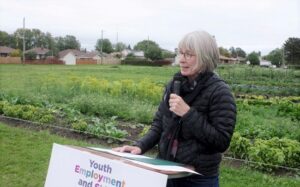First Nations doing ‘amazing job’ of protecting citizens says Federal health minister

By Rick Garrick
OTTAWA — Federal Minister of Health, the Honourable Patty Hajdu, spoke about the importance of ensuring First Nations in the Thunder Bay-Superior North riding have supports in place to protect citizens during a May 21 coronavirus disease 2019 (COVID-19) pandemic update. Her riding includes the Northern Superior Region communities of Namaygoosisagagun, Red Rock Indian Band, Biinjitiwaabik Zaaging Anishinaabek (Rocky Bay), Long Lake #58, Pays Plat and Biigtigong Nishnaabeg.
“We’ve taken action to ensure communities have personal protective equipment (PPE) as well as making sure that we understand if communities need additional health care professionals or expanded existing nursing contracts, for example,” Hajdu says during a May 21 phone interview. “We continue to monitor outbreaks in communities, and for us, the most important piece is understanding what more we can do to prevent the coronavirus from entering communities, but also how we protect communities that have had cases of coronavirus to properly isolate those cases and prevent ongoing spread.”
Hajdu also spoke about the importance of continuing with social distancing measures and other measures such as washing hands and staying home when ill as provincial governments begin to reopen their economies.
“What is happening, from my limited observations, is obviously people are getting tired of being in isolated situations away from family, away from the everyday normalcy of living,” Hajdu says. “But the challenge is we are not out of the woods yet.”
Hajdu notes that she isolates herself at home with her partner or has limited exposure in the community whenever she returns to her riding.
“Last weekend, I went to a store but wore a mask because I am well aware that I’ve been exposed to other people in the nature of my work here in Ottawa and want to limit my exposure to other people,” Hajdu says.
Hajdu says First Nations have done “an amazing job” of protecting their citizens from COVID-19.
“But the virus can be very sneaky,” Hajdu says. “It doesn’t universally express itself the same way in everybody. So for example: one person might have coronavirus and feel perfectly fine, another person might have coronavirus and have a mild headache and maybe a bit of a tickle in the back of their throat and another person might have coronavirus and have severe problems breathing.”
Hajdu says it is important for people to call public health if they are experiencing COVID-19 symptoms.
“That’s one of the ways that we are going to make sure we really clamp down on the spread of the disease is that people go and get tested if they are getting sick,” Hajdu says.
Hajdu stresses that it is important for people to understand that if COVID-19 spreads into smaller communities, “it won’t take long before it overwhelms our smaller hospital systems or health care supports.”
Hajdu also spoke about the federal government’s new supports for small businesses that do not meet the criteria of other business supports.
“We know that ensuring the success of our entrepreneurs and those small businesses is going to be critical to sustaining our economic future together,” Hajdu says. “So I would encourage them to reach out to FedNor or their community economic development organizations across the region to get the supports to weather this tough time.”
Hajdu says the business community will play an important role in how they manage their customers and staff as the economy reopens, noting that the Canadian Centre for Occupational Health and Safety has information available online about protecting staff and customers.
“It is to everybody’s benefit now even more than ever that we have robust safety and health practices in the workplace,” Hajdu says.

